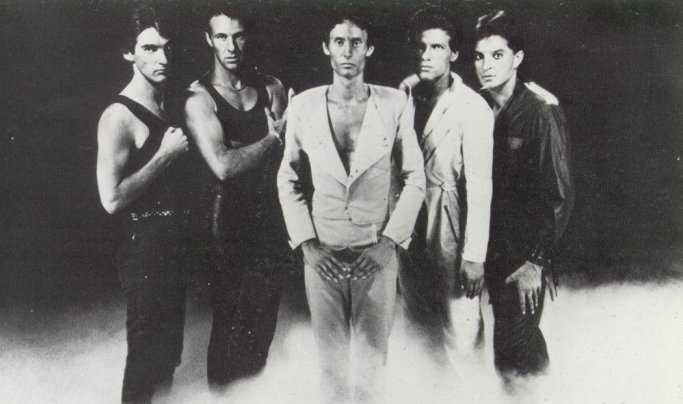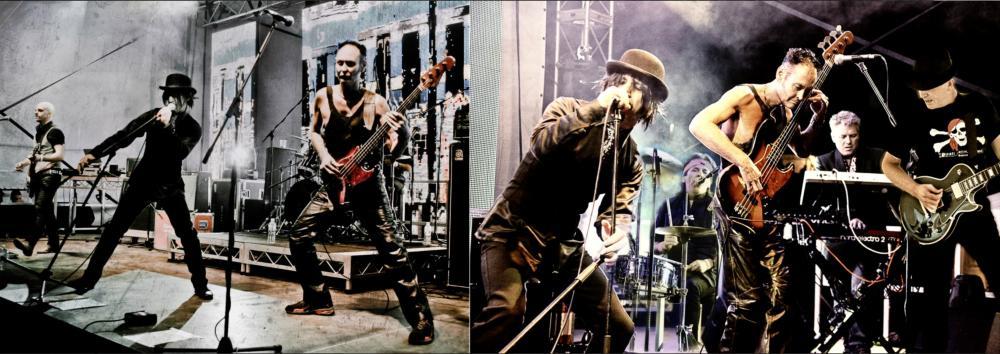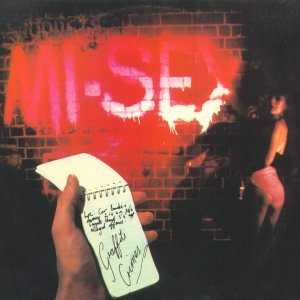Mi-Sex (also styled as MiSex) is a New Zealand new wave rock band that was originally active from 1977 to 1986. Led by Steve Gilpin as vocalist, Kevin Stanton as guitarist and songwriter and Don Martin as bassist. They provided top ten singles, "Computer Games" in October 1979 (No. 1 in Australia, No. 5 in New Zealand) and "People" in 1980 (No. 6 and No. 3, respectively). Their first two albums both reached the New Zealand top 10, Graffiti Crimes (July 1979) and Space Race (No. 1, June 1980). They were known for their cutting edge production and dynamic live shows.
Gilpin died in January 1992, two months after a serious car accident from which he never recovered. Mi-Sex have periodically reformed, including in 2011 with Steve Balbi (ex-Noiseworks) on lead vocals.
History
Mi-Sex was formed in 1978 in New Zealand when Murray Burns on keyboards, Steve Gilpin on lead vocals, Don Martin on bass guitar and Kevin Stanton on lead guitar and backing vocals (all ex-Fragments of Time) and were joined by Richard Hodgkinson on drums. The band name is adapted from an Ultravox track, "My Sex", from that group's debut album, Ultravox! (February 1977).
Gilpin had earlier performed as a solo artist in New Zealand, following his winning a TV talent quest, New Faces, in 1972 (second place in the same show was Shona Laing). Invercargill-born Burns was influenced by progressive rock bands such as Yes, whereas Stanton's influences veered towards heavy metal. During 1977 Gilpin met Martin and they set about forming their own band; Martin brought Stanton on board and together with former Father Time members Alan Moon and Phil "Smarty" Smart, they formed Fragments of Time.
Fragments of Time were influenced by British new wave and pub rock bands; they received a commission from EMI New Zealand's Peter Dawkins, who wanted a punk-new wave record to introduce the label's new roster. Their line-up changed, with Moon replaced by Burns and Smart leaving, replaced briefly by Steve Osborne and then by Hodgkinson. Fragments of Time developed a quirky, futurist, paranoia-themed blend of new wave, punk, and pub rock, amalgamating some of the textures common to Britain's Ultravox with those more associated with The Stranglers. They blended this with a liberal dose of on stage theatrics. At around the same time, they changed their name – urgently needed for their demo. In a meeting in a room at the back of the Aranui hotel which they were playing in, they accepted the name Stanton had proposed.
Mi-Sex released their first single for EMI New Zealand, "Straight Laddie" (originally intended as a demo), early in 1978. Early performances include the Wellington Institute of Technology and Dr Johns (Ray Johns), on the same day with demo recording at Dellbrook studios in Tawa, and the bus breaking a gearbox on the Ngauraunga Gorge section of motorway.
In August 1978 the band relocated to Sydney, where they became the city's "fourth biggest drawcard" within six months. They were signed to the Australian division of CBS Records by the label's then A&R manager and house producer, Dawkins, who had produced "Straight Laddie". Their first single for CBS, "But You Don't Care", was released in Australia in June 1979, which peaked at No. 25 on the local Kent Music Report Singles Chart and No. 33 on their native Official New Zealand Music Chart.
Their debut album, Graffiti Crimes was issued in July 1979 to coincide with their national tour supporting Talking Heads. They also headlined their own tour of Australia. It reached No. 6 in New Zealand and the top 20 in Australia. It was also produced by Dawkins at Studios 301, during April and May 1979. The original album version had ten tracks, Luis Feliu of The Canberra Times felt "The songs are all well rounded with a beginning, middle and end, and pulsating rhythms for the colourful lyrics to bounce off. Hardly any time wasted between cuts too, straight into the next song. Naturally, this sort of music has to be played at a gutsy volume level."
Feliu described the group's members as "a close-knit unit, musically and personally, and live together in a large house in Sydney. Vocalist Steve Gilpin (formerly a TV balladeer in NZ) is not just another new-wave singer, he actually possesses a naturally powerful, clear and melodic voice. Guitarist Kevin Stanton is proficient and imaginative, so too is keyboards-synthesiser player Murray Burns. Bassist Don Martin and drummer Richard Hodgkinson provide a controlled, energetic rhythm and beat."
Added to later versions of the LP is their biggest hit, the synthesiser-driven single, "Computer Games", which was co-written by Burns, Gilpin and Stanton. It was released in Australia on 1 October 1979. Dawkins had first heard the track at the album launch, in July, he asked Stanton, "'Why didn't you play me "Computer Games" when we were doing the demos for the album?'. Kevin answered in the most succinct way possible, 'Because I hadn't written it yet!'"
Musicologist, Ian McFarlane, opined that it was an "electro-pop anthem... With its simplistic, brain-teasing riff and Gilpin's mannered vocal yelps, 'Computer Games' boasted little substance but was constructed for maximum effect. It came to epitomise the one word which has plagued the memory of Mi-Sex: 'contrived'." The single went to No. 1 in Australia, made the top 5 in New Zealand; and reached the top 10 in Austria, Canada, France, Italy, South Africa and West Germany.
In October 1979 Mi-Sex supported Cheap Trick, The Canberra Times' Jonathon Green caught their gig at Bruce Stadium, "The New Zealanders played one of the best sets I have ever heard from them. It was crystal clear and as tight as could be in a live performance... [They] managed to deliver an uncluttered sound which throbbed with energy and power." In the following month they appeared at the Concert of the Decade at the Sydney Opera House – an edited hour of concert footage was broadcast by the Nine Network under the same name and a double-LP was issued on Mushroom Records later that month.
During April and May 1980 they toured the United States and Canada for five weeks and then toured New Zealand and Australia. For their second album, Space Race (June 1980), the label provided a "massive promotional campaign for which 'Are you a clone? . . . No, I'm in the Space Race' was the slogan, and little rubber mannequins of the alien featured on the front cover popped up all over the place." Ed Nimmervoll of Howlspace website felt that the album was "talking about overpopulation, environmental issues, genetic engineering and other issues of great importance for the future."
Dawkins produced the album, recording it in January 1980. In New Zealand it peaked at No. 1 and in Australia it reached No. 6. Space Race provided another top 10 single, "People", which reached No. 3 in New Zealand and No. 6 in Australia. The title track was the next single and peaked in the top 20 in New Zealand and top 30 in Australia. Although Mi-Sex toured Australia and New Zealand through 1981 – performing 366 gigs in that year – the group "found its popularity in slow decline."
Burns told The Australian Women's Weekly's Susan Moore that "When we arrived new wave was very full-on and we had pretty much a street image. Then when we did Space Race, which we felt was an extension of what we were doing, I guess some people didn't like the idea of a concept album ... we copped a lot of flack."
Their third album, Shanghaied! (November 1981), was co-produced by the band's members, mostly by Burns and Stanton, together with John L Sayers and Dave Marett. McFarlane described it as "arguably the band's best album... [which] failed to impress the record-buying public." Moore declared it "should bring the band back on an even keel. It's more down to earth and heart-felt." Also in November Hodgkinson was replaced on drums by Paul Dunningham (ex-Coup D'Etat).
Late in 1982 Stanton temporarily left the band due to ill-health, he was replaced on guitar by Ted Yanni. After four months, Stanton returned and Yanni remained until he was replaced in turn by Colin Bayley (ex-Silent Movies) on guitar. The group continued as a six-piece. For their fourth studio album, Where Do They Go? (1983), they worked with US producer, Bob Clearmountain. Nimmervoll described the group as "searching for more low key lyrical subjects and simpler music."
Mi-Sex took a hiatus from February 1986 with Stanton moving to London in April to work with Fairlight and produce feature film sound tracks. Gilpin remained in Australia, working with his cover band Under Rapz. In November 1991, while returning to his home after a gig, he was seriously injured in a major car accident, and lapsed into a coma from which he never recovered. He died in Southport Hospital on 6 January 1992.
According to Nimmervoll, "Murray now lives outside of Byron Bay and continues with Twilight Productions and other projects in Sydney, Don is still financial controller for Bob and Pete's in Sydney, Kevin lives in Brisbane and runs his own company, Speaking Image Productions, a record label and video, film, multimedia and internet production consortium... and drummer, Paul, lives in New Zealand."
The band reunited for a fund-raising concert following the 2011 Christchurch earthquake, with former Noiseworks bass player Steve Balbi on lead vocals. As of 2014 they were back in the studio working on new songs, 33 years since their last release. Stanton had been forced to sit out, having recently undergone serious surgery on his spine which rendered his entire left arm useless, but repairable with intricate neurosurgery.
In February 2016, Mi-Sex announced the release of their first single in 33 years, titled "Somebody". Their next single, "My Sex Your Sex", was released on 3 June 2016. Their first album since 1983's Where Do They Go, titled Not from Here, was released on 9 September 2016.
The "Culture" controversy
Mi-Sex gained publicity during 1980 due to then-Prime Minister of New Zealand, Rob Muldoon. His government had imposed a 40% sales duty on records, much to the objection of the New Zealand Arts Council, record retailers and record companies. On 21 April, Muldoon claimed that popular music was "not culture", stating that "The records sold in this country are not Kiri Te Kanawa's, they are 50 to 1 those horrible pop groups and I'm not going to take the tax off them."
Mi-Sex were due to start a major New Zealand tour five weeks later, and – sensing an opportunity for publicity – Kevin Stanton invited Muldoon to attend their Wellington concert during a radio interview in Hamilton, an invitation which Muldoon was urged to accept when quizzed by the opposition in parliament. The Prime Minister attended the concert along with his daughter (who reportedly loved the concert) and met with the band after their performance, but the sales tax remained. Muldoon was pleasant but Burns recalled seeing a newspaper article the next day in which he was quoted as saying that it was about as cultural as On the Mat, which was a wrestling show of the time.
Awards and nominations
In April 1980 Mi-Sex received six nominations at Australia's TV Week/Countdown Music Awards for 1979 and won four categories: Most Popular Album or Single and Best Australian Single for "Computer Games", Best New Talent (Johnny O'Keefe Memorial Award) for the band and 'Best Australian Producer' for Dawkins' work on Graffiti Crimes. As the group were then touring the US and Canada, Dawkins collected the awards on the band's behalf.Cover versions
In 1999, "Blue Day" was covered by Eurodance-pop artist Nicolette. Released in New Zealand by Universal Music, it reached number 20 in the charts. While the version horrified some purists, it was well received by the band and Nicolette subsequently collaborated with Colin Bayley on several songs.Discography
Albums
Singles
| Date | Title | Label | Peak chart positions | Catalogue number | ||||
|---|---|---|---|---|---|---|---|---|
| NZ | AUS | |||||||
| 1979 | Graffiti Crimes | CBS | 6 | N/A | 463031 2 | |||
| 1980 | Space Race | 1 | SBP 237442 | |||||
| 1981 | Shanghaied! | — | SBP 237701 | |||||
| 1983 | Where Do They Go? | — | 80 | MX 203364 | ||||
| 2016 | Not from Here | Golden Robot | — | 93 | ||||
| EPs | ||||||||
| 1988 | Mi-Sex EP | CBS | — | — | 651091-7 | |||
| Compilation albums | ||||||||
| 1985 | '79–'85 | CBS | — | — | SBP 8117 | |||
| 2007 | The Essential Mi-Sex | Sony | — | — | B000NJLPUW | |||
| Year | Title | Peak chart positions | Album | |||||
| NZ | AUS | AUT | CAN | NL | US | |||
| 1978 | "Straight Laddie" | — | — | — | — | — | — | Non-album single |
| 1979 | "But You Don't Care" | 33 | 25 | — | — | — | — | Graffiti Crimes |
| "Computer Games" | 5 | 1 | 16 | 2 | 44 | 61 | ||
| 1980 | "People" | 3 | 6 | — | — | — | — | Space Race |
| "Space Race" | 19 | 28 | — | — | — | — | ||
| "It Only Hurts When I'm Laughing" | — | 84 | — | — | — | — | ||
| 1981 | "Shanghaied!" | — | — | — | — | — | — | Shanghaied |
| "Falling In and Out" | 48 | 20 | — | — | — | — | ||
| "Missing Person" | — | — | — | — | — | — | ||
| 1982 | "Castaway" | — | 20 | — | — | — | — | Non-album singles |
| "Down the Line (Makin' Love on the Telephone)" | — | 37 | — | — | — | — | ||
| "Lost Time" | — | 57 | — | — | — | — | ||
| 1983 | "Only Thinking" | — | 48 | — | — | — | — | Where Do They Go? |
| "Blue Day" | 36 | 24 | — | — | — | — | ||
| "5 O'Clock (In the Morning)" | — | — | — | — | — | — | ||
| 2016 | "Somebody" | — | — | — | — | — | — | Not from Here |
| "My Sex Your Sex" | — | — | — | — | — | — | ||




Nenhum comentário:
Postar um comentário